Shizuchika Tea Shop Issa : Entrusted with the Passion of Shizuoka City’s tea producers【Shizuoka City, Shizuoka Prefecture】
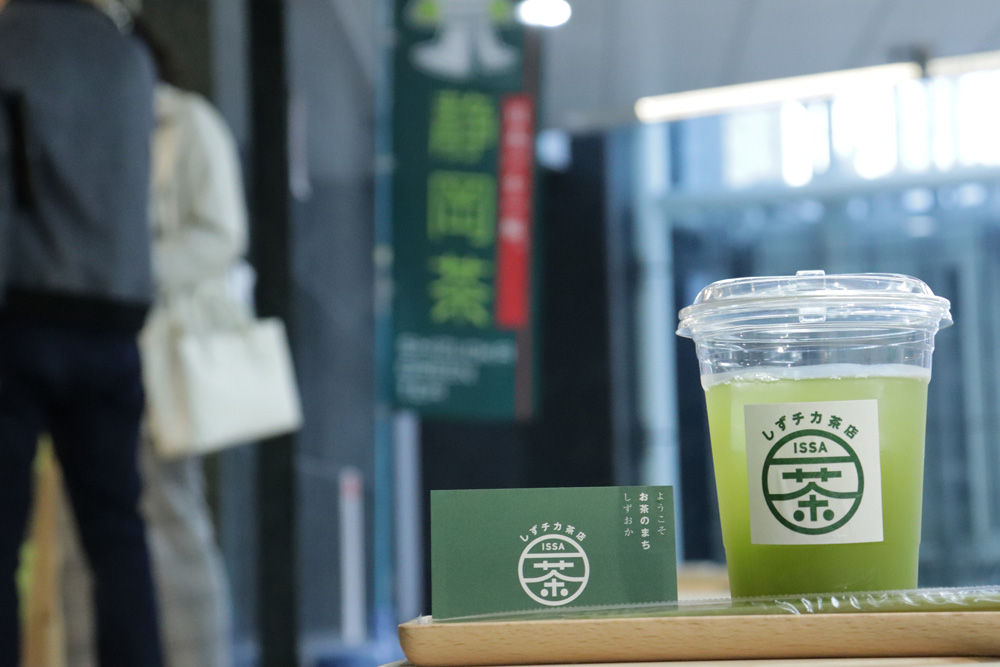
Shizuoka City has the longest history of tea production in Shizuoka Prefecture, and is a city that has developed along with tea. Shizuchika Tea Shop Issa, located in the underground plaza at the north exit of Shizuoka Station in Shizuoka City, offers a collection of teas lovingly crafted from a total of some 50 tea producers based in the city. All teas displayed in the store are specially priced at 500 yen. The café menu, brewed by experienced and passionate staff members, is a popular way to enjoy authentic Shizuoka tea at a reasonable price. Its products and fantastic location attract many visitors from both inside and outside of the prefecture, providing a window into Shizuoka City’s world of teahouses.
This article describes the tea serving style and café menu at Shizuchika Tea Shop Issa through an interview with Kimie Otsuka, the shop’s general manager and former board member of the Japanese Tea Instructors Association and council member of the World Green Tea Association.
Contents
- 1 About Shizuchika Tea Shop Issa
- 2 The cafe menu at Shizuchika Tea Shop Issa
- 3 Interview: Shizuchika Tea Shop Issa is entrusted with the hot passion of Shizuoka City’s tea producers
- 3.1 Tea Producers from Shizuoka City collaborate to promote Shizuoka tea
- 3.2 We want to bring you the best of the tea that Shizuoka City’s artisans have lovingly created.
- 3.3 Tea has existed for thousands of years and has played an important role in the development of the city of Shizuoka.
- 3.4 When I consider that I have been engaged in tea for many years, I can confident that “tea will always be a part of our lives.”
- 4 Information of Shizuchika Tea Shop Issa
About Shizuchika Tea Shop Issa
Shizuchika Tea Shop Issa is a Japanese tea cafe located in the underground plaza at the north exit of Shizuoka Station. The cafe is operated by the Shizuoka Tea Traders Cooperative Association, and Shizuchika Tea Shop Issa sells teas carefully crafted by about 50 member tea shops at a special price of 500 yen (including tax). Aside from the special pricing, the wide variety of tea supplied by various tea shops in Shizuoka City, all in one place, is a major attraction. In most cases, this kind of gathering of a variety of teas is rare.
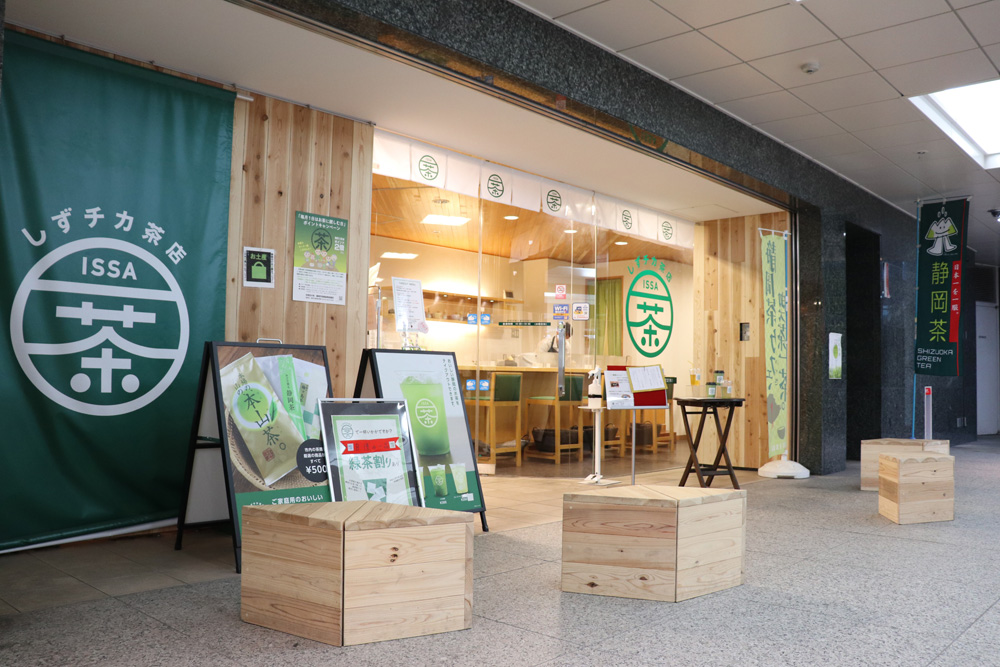
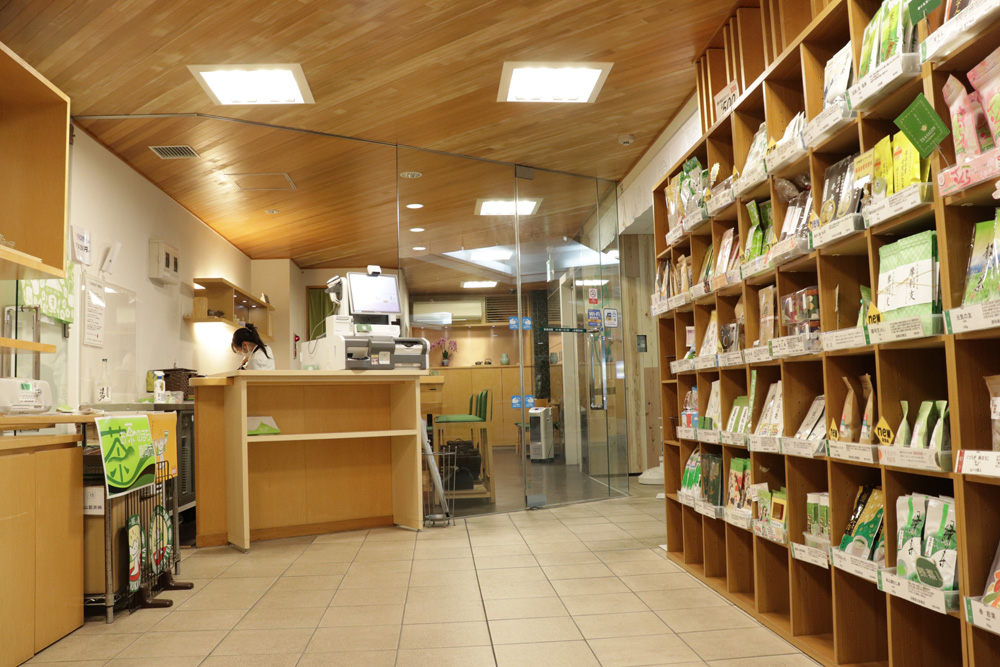
In the hot summer months, cold brew tea and tea bags are displayed; in the fall, matured tea; and in April and May, the year’s new shincha teas are displayed. In spring, packaging featuring cherry blossoms is used to create a colorful seasonal atmosphere. This is not just a simple cafe, but an opportunity for customers to experience the true quality of the Shizuoka tea brand.
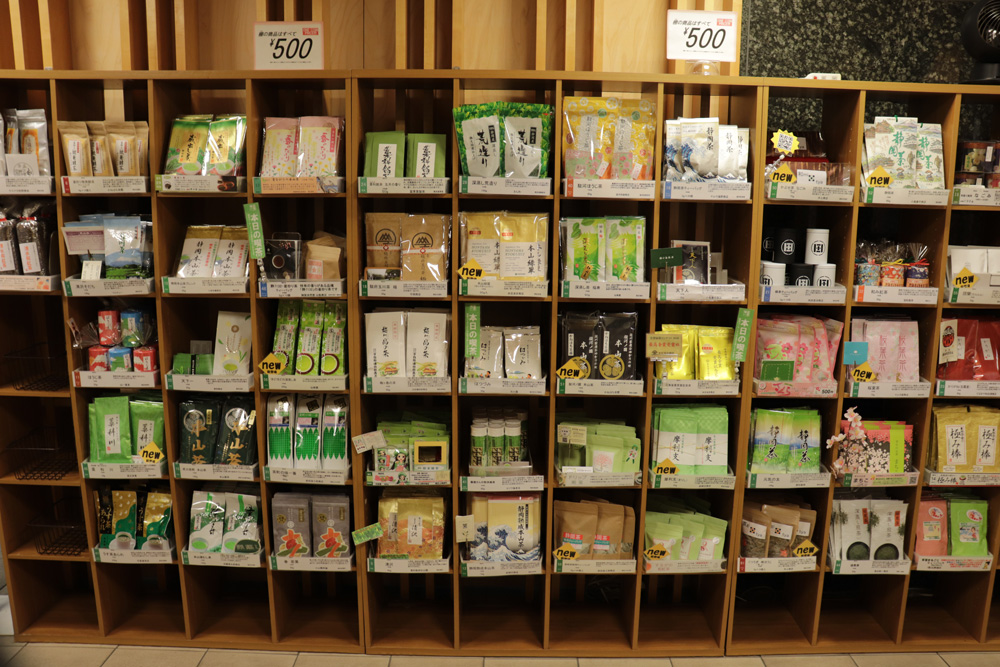 ▲Tea shops with stores in Shizuoka City, such as Chamachi KINZABURO and Yamanashi Shoten, display their teas side by side.
▲Tea shops with stores in Shizuoka City, such as Chamachi KINZABURO and Yamanashi Shoten, display their teas side by side.
While the amalgamation of teas from about 50 different tea producers in the same shop is in itself a rare event, Shizuchika Tea Shop Issa also offers a selection as part of its café menu. Cafes with this system are unlikely to be found anywhere else in Japan.
Here we will introduce a section of Shizuchika Tea Shop Issa’s cafe menu.
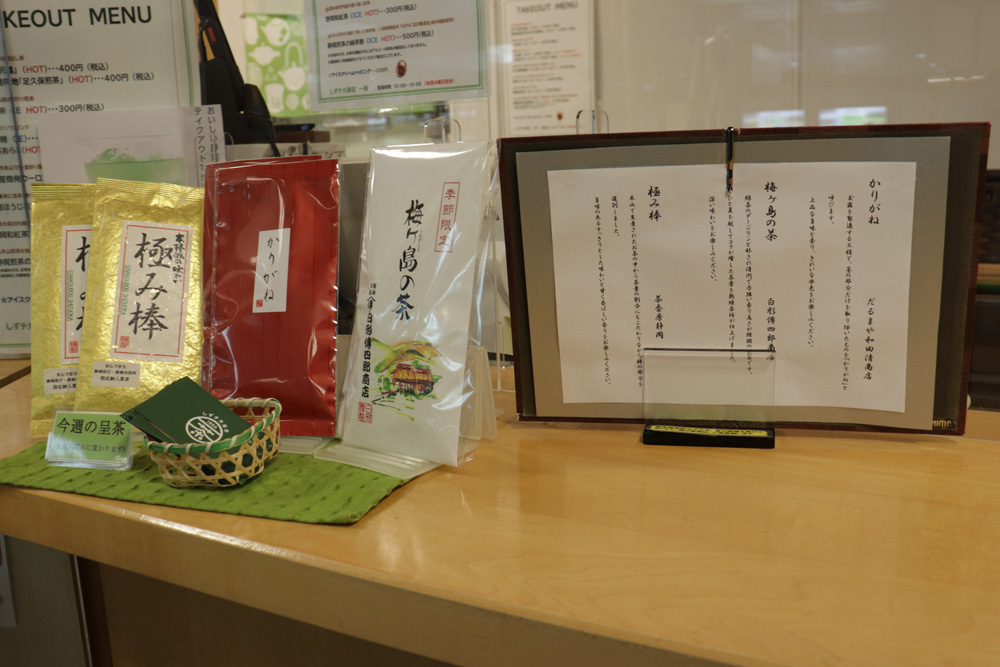
Issa set
This is a set that allows you to enjoy three teas chosen from the 50 types of tea available, along with traditional Japanese sweets. The first tea is brewed with great care by specialist staff, and from the second and subsequent teas, guests are invited to brew themselves using a kyusu (teapot). This method enables customers to enjoy the tea at their own pace.
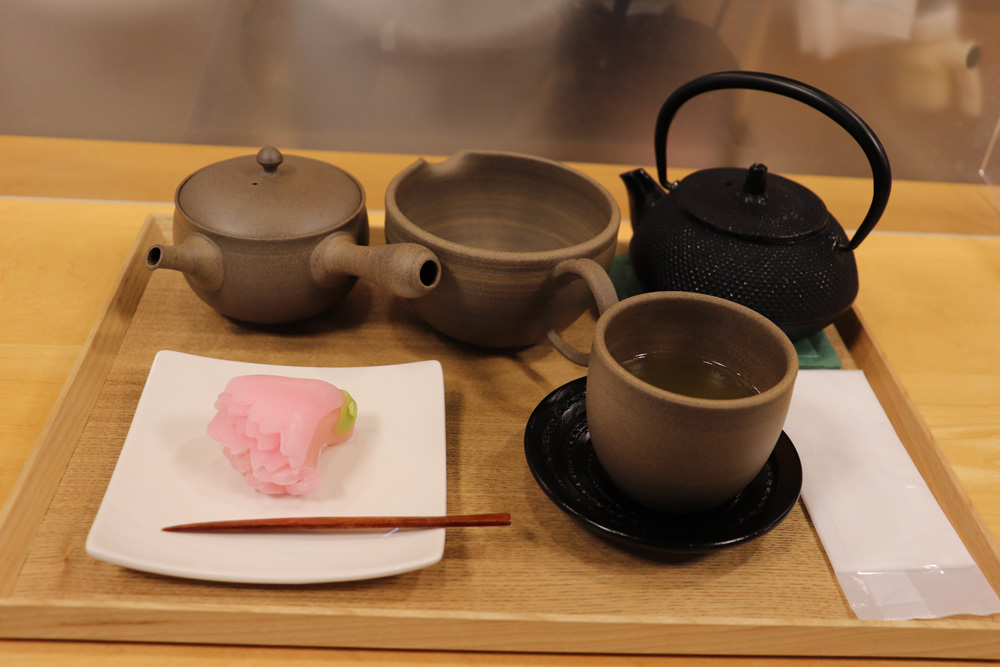
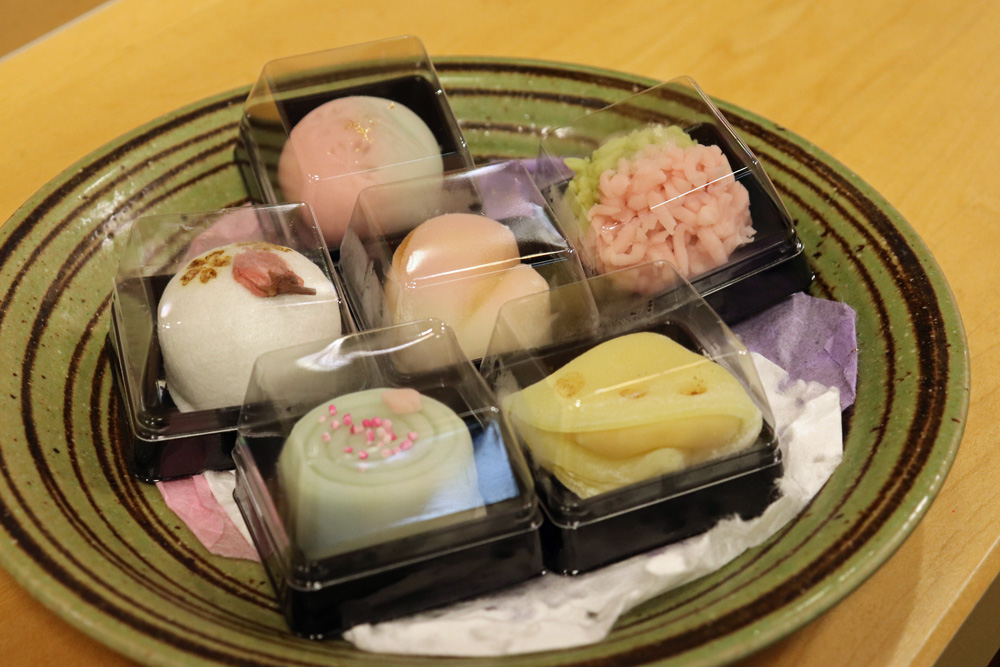 ▲Enjoy the sweets of your choice from the selection provided.
▲Enjoy the sweets of your choice from the selection provided.
The staff have mastered the art of brewing each tea with the suitable technique to enhance its flavour. Whenever the teas they handle change, brewing technique is also modified appropriately. Their enthusiasm and commitment to tea is evident in their mission to serve as the go-to destination for Shizuoka City’s tea shops.

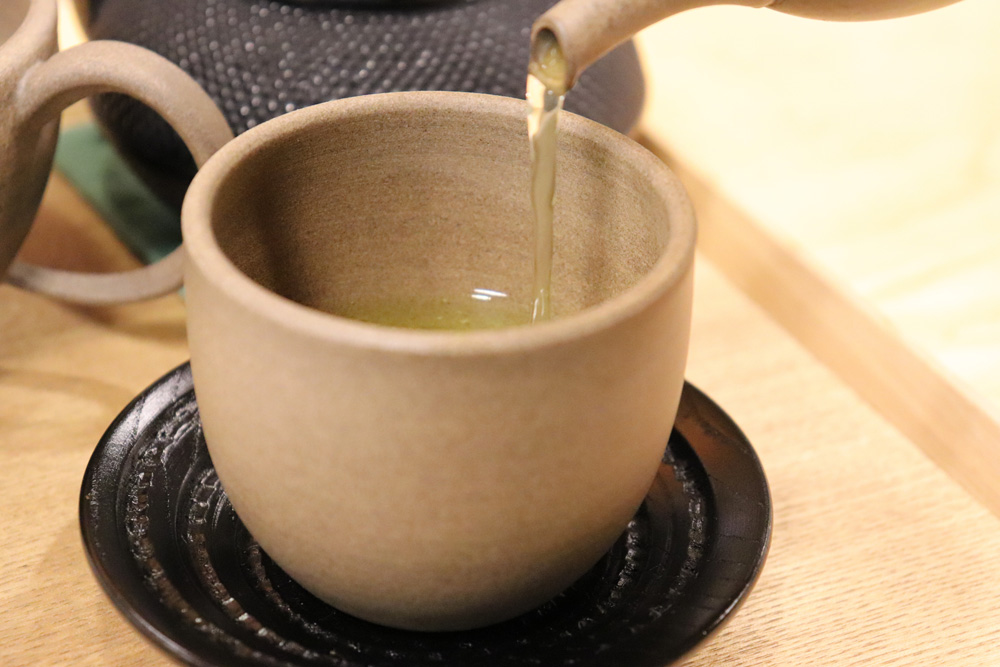
If you like the tea you tasted in the Issa set, you can purchase it from the shop’s retail corner. The tea sets change every Thursday, and can be enjoyed until Tuesday of the following week. (The shop is closed on Wednesdays.)
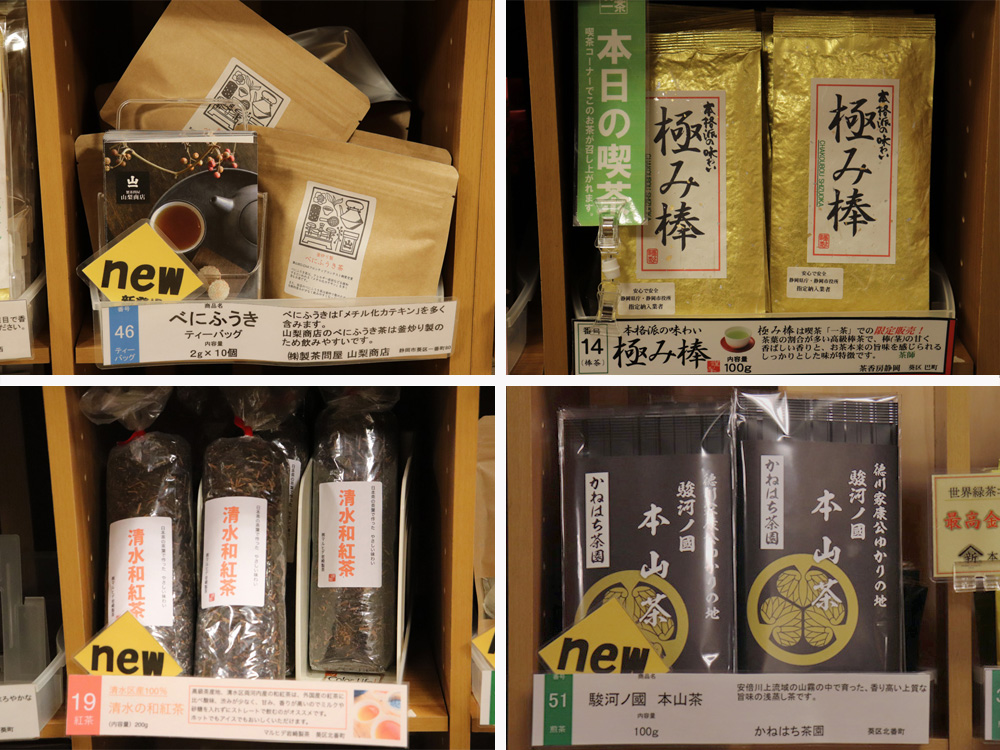
Shaka-shaka matcha set
For those who have no experience in Japanese tea ceremonies, preparing matcha may seem like a daunting experience. The “Shakashaka Matcha Set” was designed to make it easy and fun for anyone to enjoy making matcha. When ordering, customers choose utensils for making matcha and tea sweets, and staff will then carefully assist them in making the tea. This ingenious idea provides a fantastic opportunity to share the enjoyment of matcha tea.
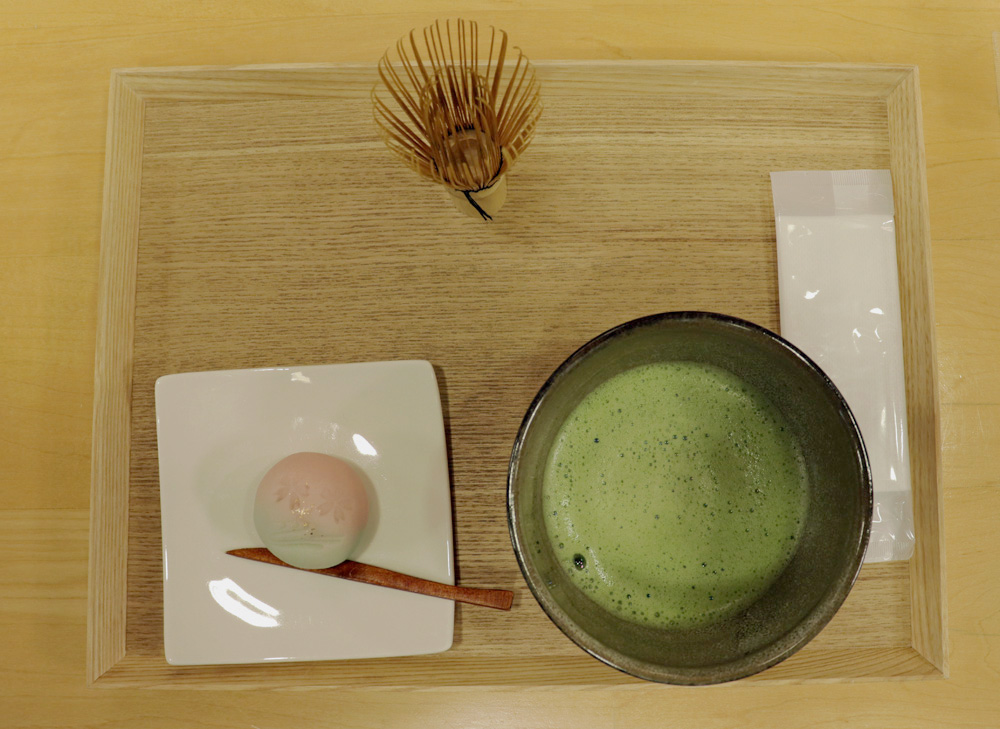
The first time you make your own Honyama matcha will surely be a memorable experience. Since there are as many chasen (tea whisks) as seats available, order with confidence even at busy times. This attention to detail will surely prove to be a valuable asset to your tea drinking lifestyle.
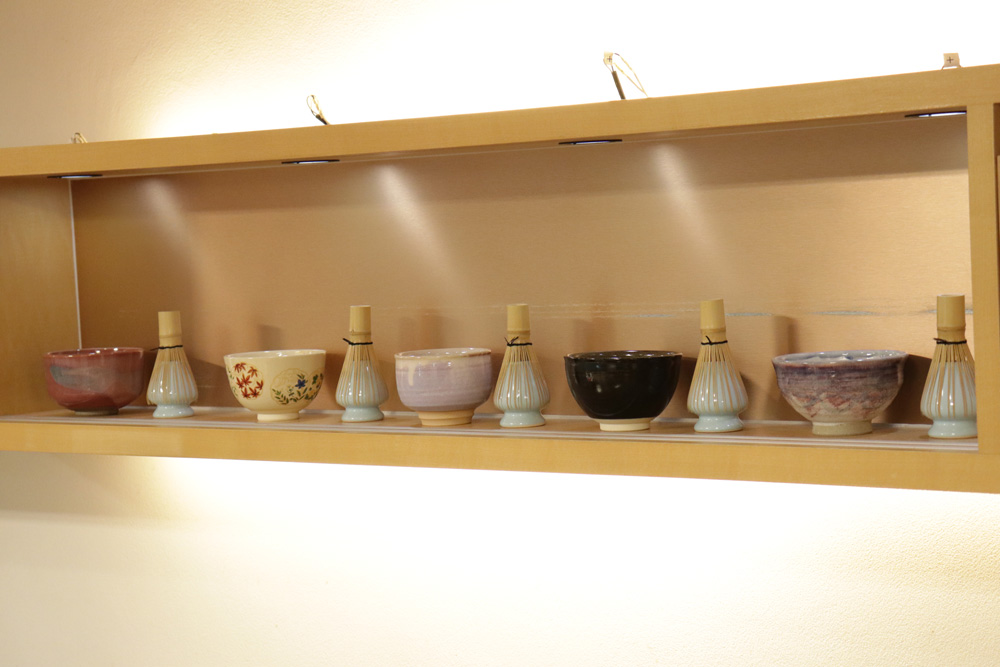
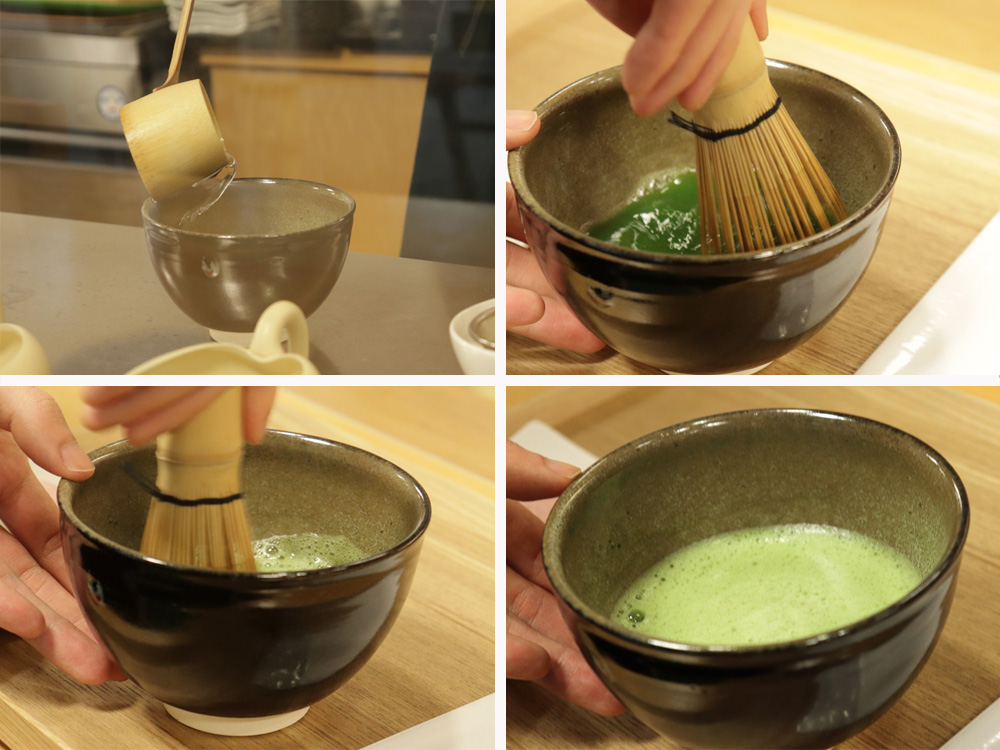
Takeout drinks
Shizuchika Tea Shop Issa also offers a takeout drink menu. The menu includes kyusu-brewed gyokuro and sencha teas for an authentic taste, as well as Japanese black tea and lightly fermented oolong tea produced in Shizuoka City.
The menu also offers a wide variety of items such as Usucha Sugar, which has a refreshing sweetness and a gentle green tea aroma, and a Green Tea Wari, which is Shizuoka tea mixed with local sake. With such a varied menu, customers can enjoy Shizuoka tea in all its evolving forms.
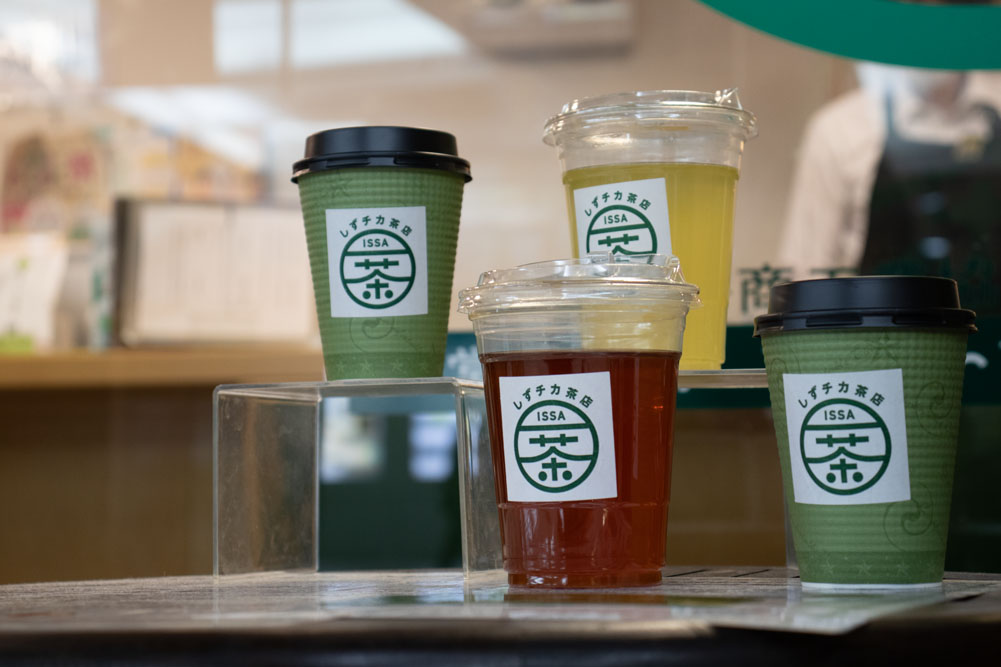
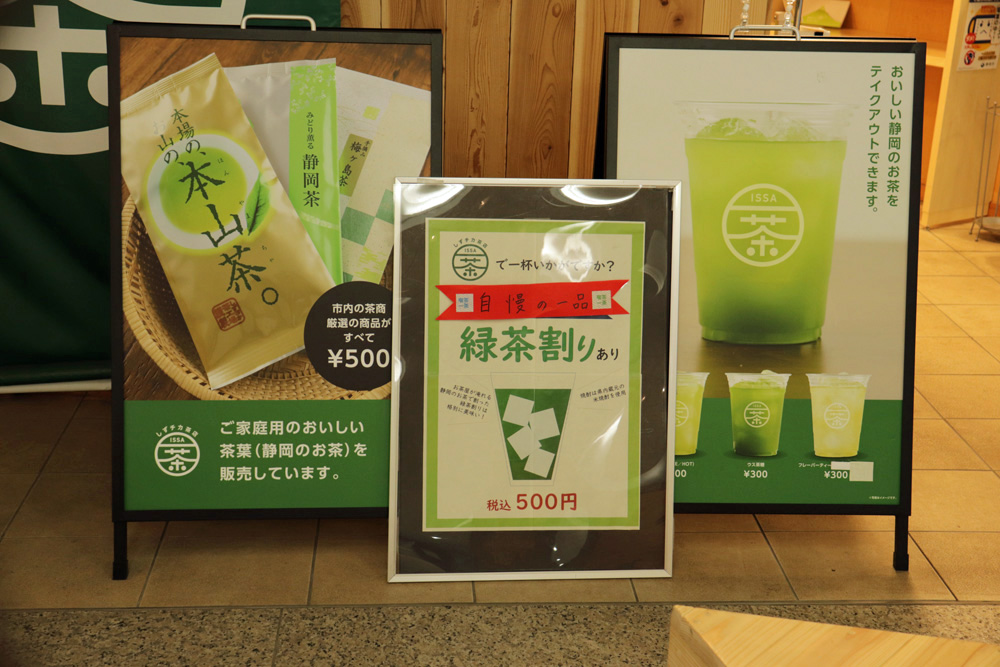
Interview: Shizuchika Tea Shop Issa is entrusted with the hot passion of Shizuoka City’s tea producers
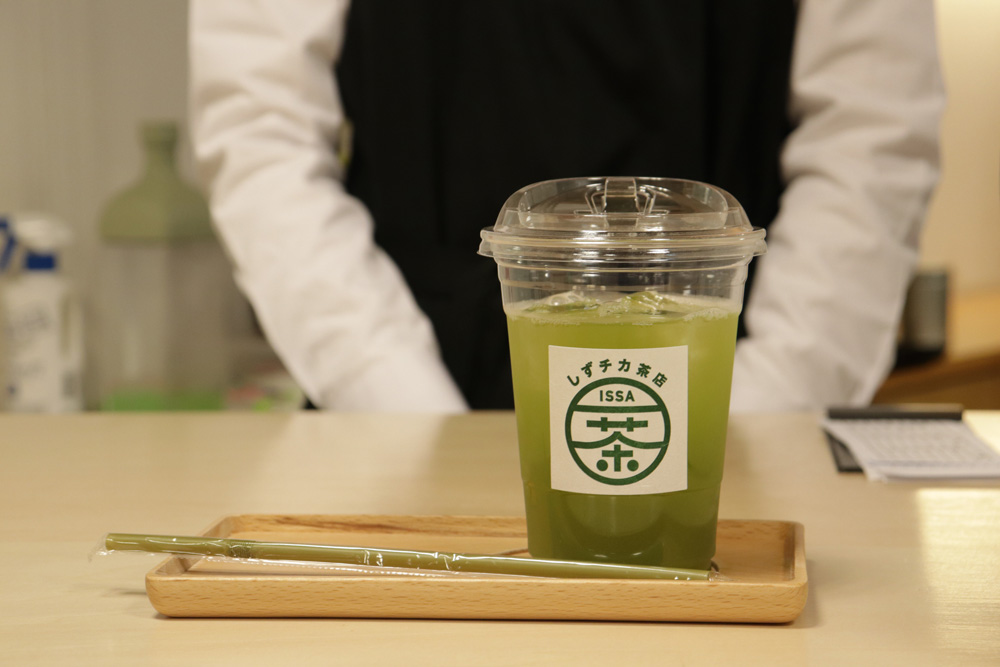
We spoke with Kimie Otsuka, general manager, who previously served as a director of the Japan Association of Tea Instructors and a council member of the World Green Tea Association.
Tea Producers from Shizuoka City collaborate to promote Shizuoka tea
Shizuchika Tea Shop Issa is a tea shop operated by the Shizuoka Tea Trading Cooperative Association. Here, about 50 tea shops in Shizuoka City sell tea produced diligently at the special price of 500 yen.
–It is truly a wonderful initiative to bring so many teas from so many tea shops together in one place. The price is also surprisingly low at a flat rate of 500 yen.
The wide selection and special price was made possible by the passion and support of the Shizuoka Tea Trading Cooperative Association.
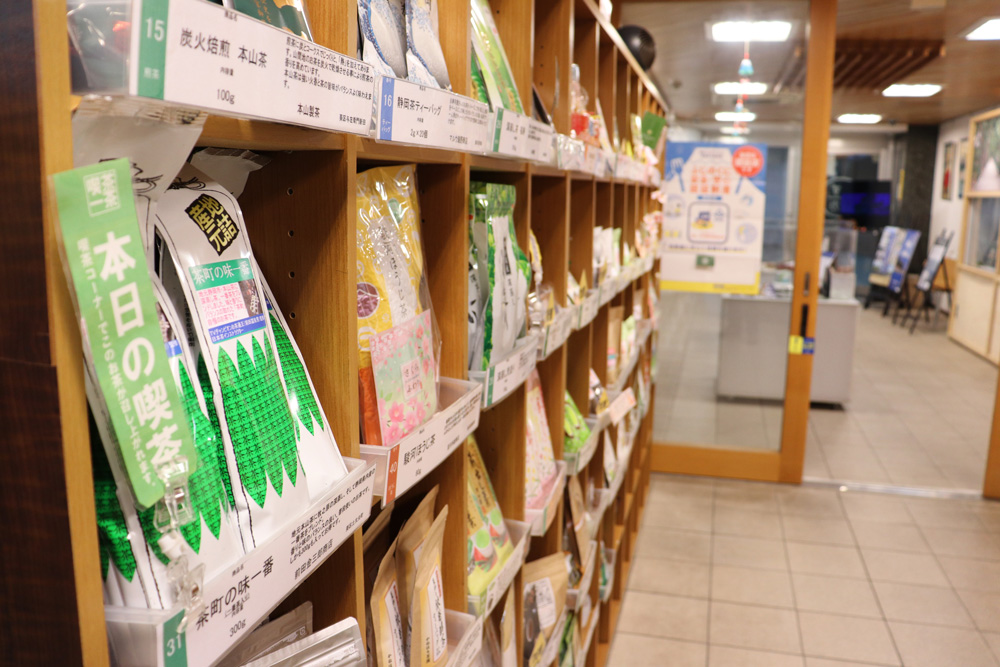
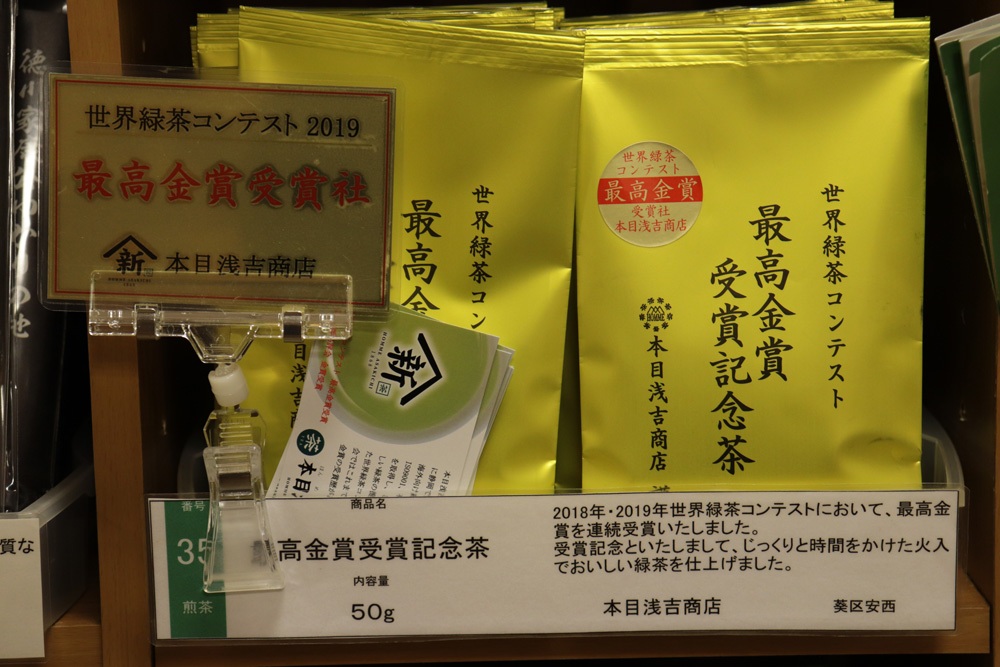 ▲All these high quality teas are sold for a flat rate of 500 yen, including products that have won the highest gold medal at the World Green Tea Contest.
▲All these high quality teas are sold for a flat rate of 500 yen, including products that have won the highest gold medal at the World Green Tea Contest.
Shizuoka has many wonderful things to offer, not just tea. We plan to continue to publicize Shizuoka tea and Shizuoka City, including collaborations with the adjacent exhibition space and promotional activities in the station’s underground area.
–Why such a strong commitment to promoting Shizuoka tea?
About 15 years ago, I attended a symposium at Shizuoka University. I remember posing a question to the students, “What do you drink with your meals?” 95% of the responses were not tea, but water.
If you think about it, water is commonly served complimentary at restaurants familiar to students such as chain restaurants and ramen stores. Tea is served at donburi restaurants and kaitenzushi (conveyor-belt sushi) restaurants, but water, not tea, is usually served at establishments that cater to the younger generation.
Now that tea is no longer the natural choice for mealtimes as it used to be, we need to be proactive in promoting its use.
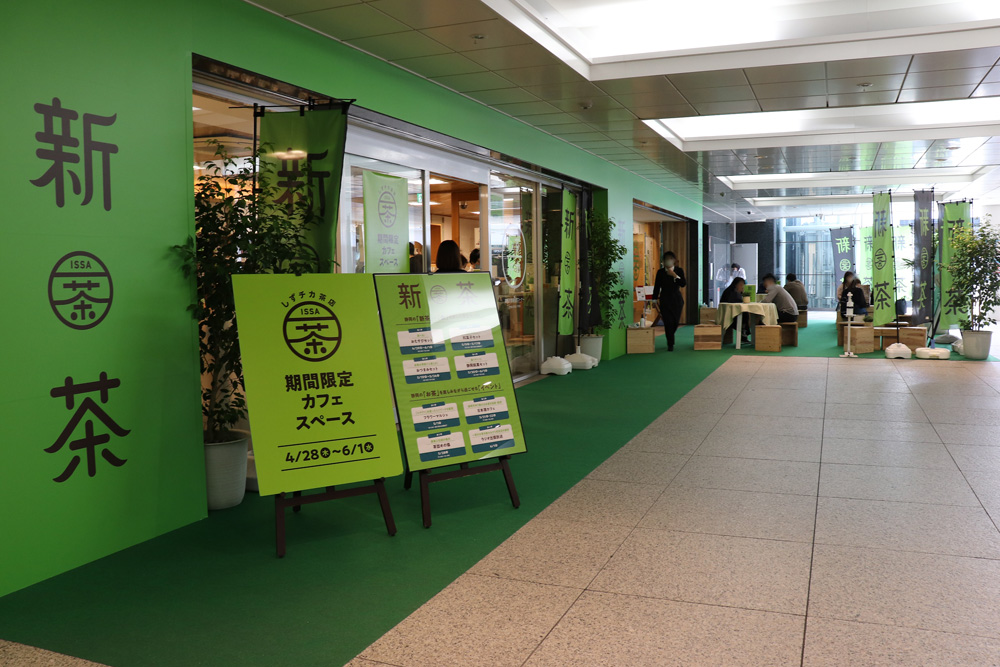 ▲A café space is set up for a limited time during the shincha (new tea) season.
▲A café space is set up for a limited time during the shincha (new tea) season.
We want to bring you the best of the tea that Shizuoka City’s artisans have lovingly created.
Fukamushicha (deep steamed tea) tends to attract most people’s attention, but in fact, gogumicha, produced by tea masters using traditional techniques, is also a wonderful product. (Gogumi is a traditional technique combining teas from different regions in a unique ratio to create a tea with a deep aroma and flavor.)
Some tea masters find it difficult to communicate about the teas they make, but there are in fact many great artisans who are not widely known to the public.
With this background, I feel that we still have much to accomplish. Since I took over as general manager of Shizuchika Tea Shop Issa in April 2021, I have provided guidance in all aspects of the business, from how to brew tea and choose tea utensils to the menu and store layout.
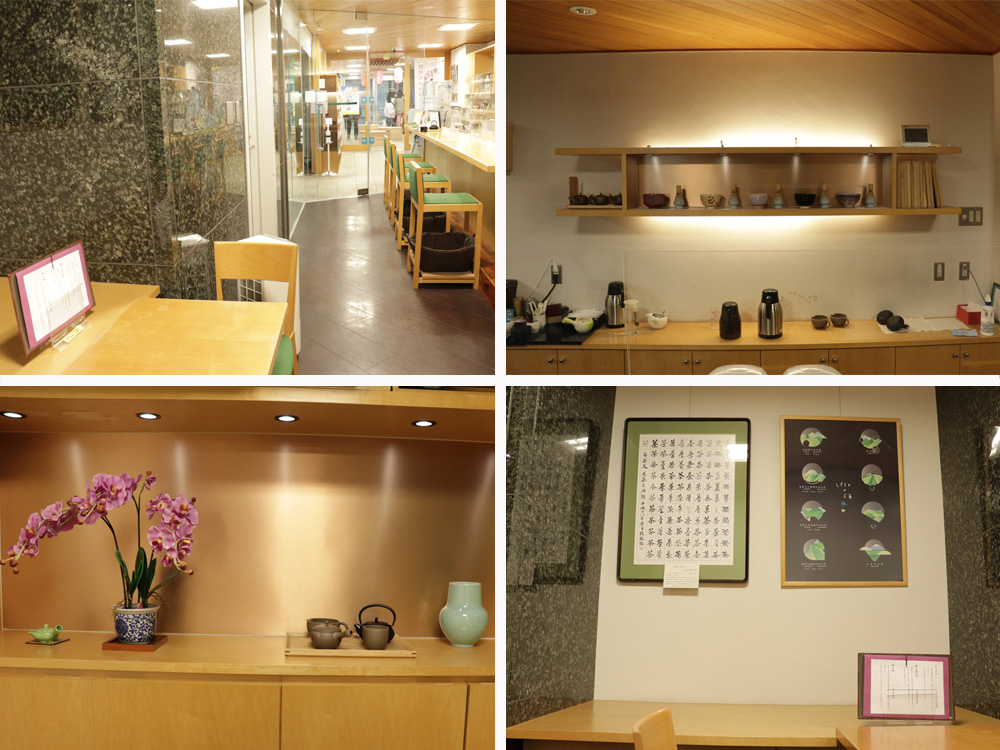
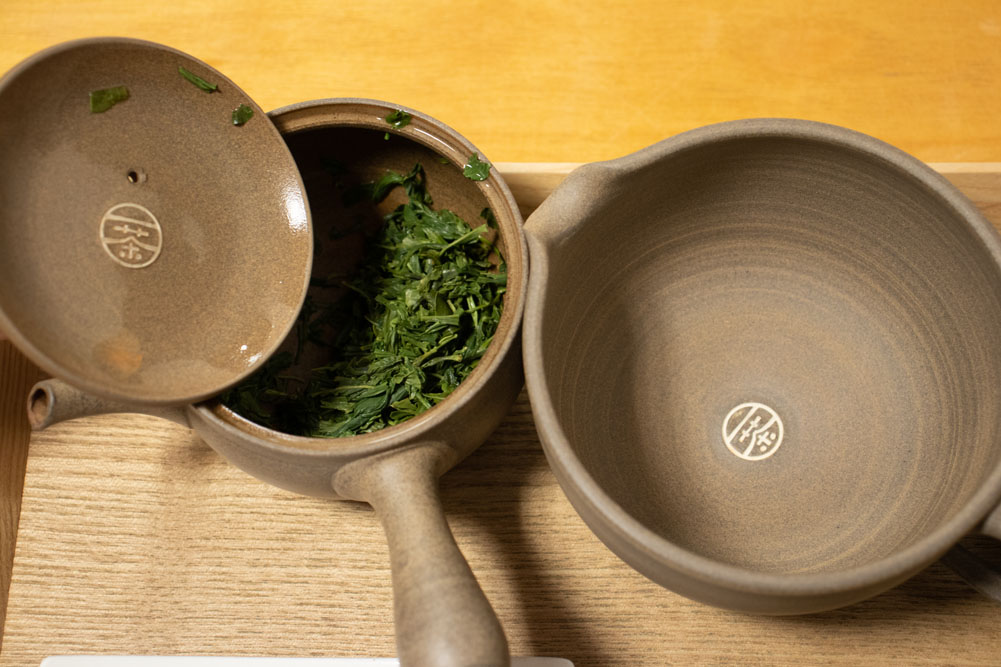 ▲Original tea utensils from Shizuchika Tea Shop Issa. It is stamped with a seal with the word “issa” (Tea Number One).
▲Original tea utensils from Shizuchika Tea Shop Issa. It is stamped with a seal with the word “issa” (Tea Number One).
–Are you involved in the instruction of the tea brewing process as well?
Yes. As the teas we handle change, so does the way we brew them. We decided that it was necessary for our staff to gather once a month and conduct training on the best way to brew each specific tea.
I am a certified Japanese Tea Instructor, Taiwan Oolong Tea Connoisseur, Black Tea Instructor of the Japan Black Tea Association, Chinese Tea Artisan, and Chinese Tea Evaluator. For each tea we stock, I provide theoretical guidance to staff on basic principles such as how the temperature of the hot water affects the flavor and aroma.
These teas are made with the utmost care by our valued cooperative members. We want to offer them to our customers in their best condition.
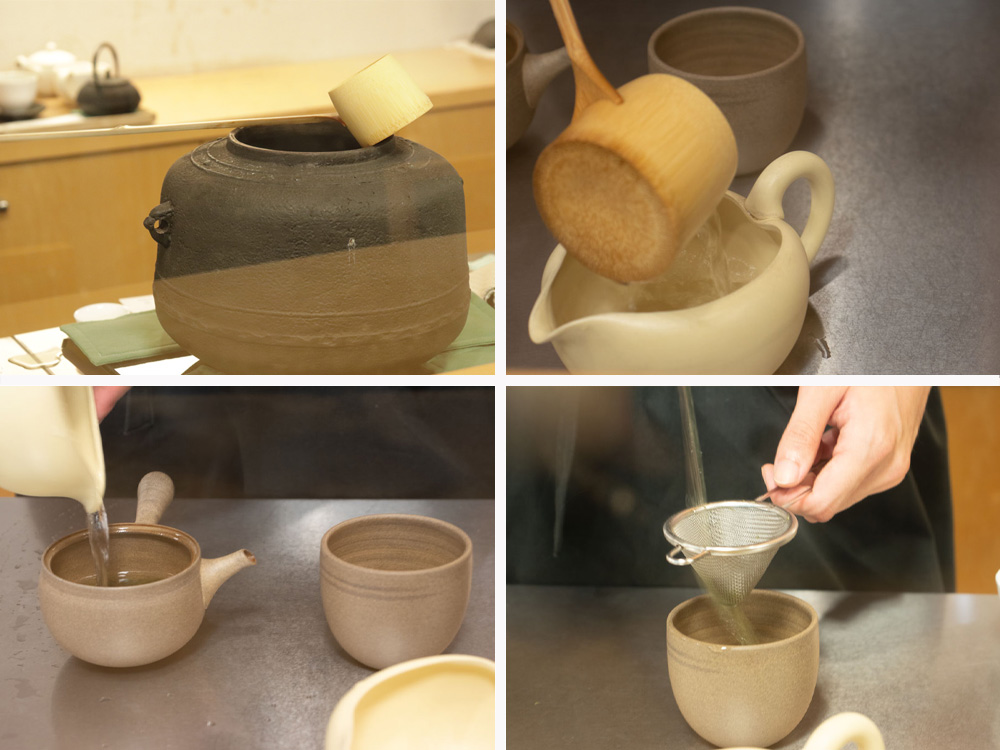
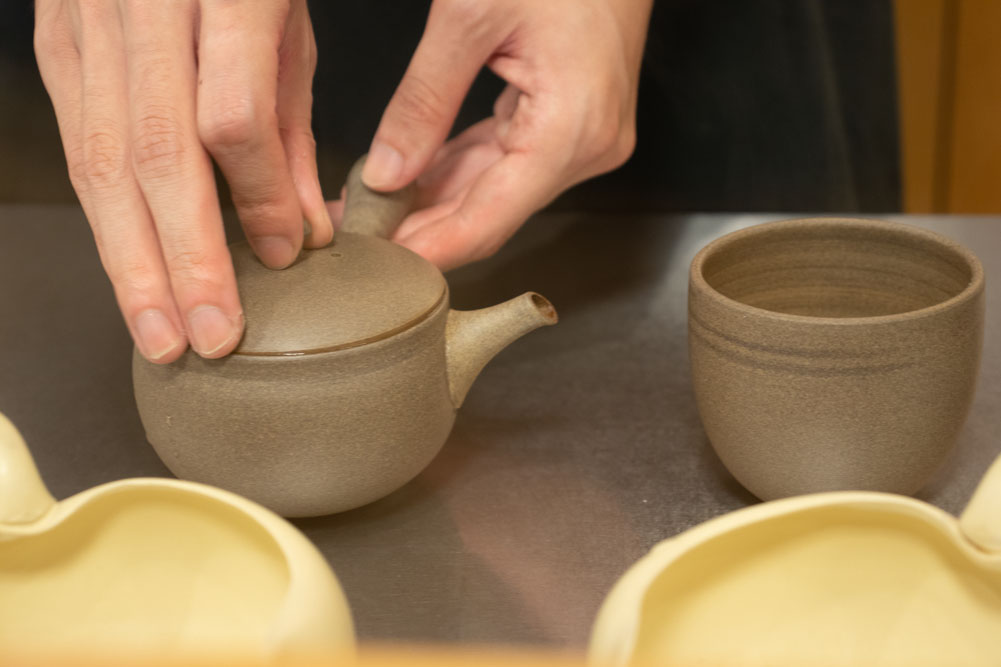
Tea has existed for thousands of years and has played an important role in the development of the city of Shizuoka.
The earliest document in which the existence of tea is clearly stated is from 59 BC. It is therefore believed that tea has been a part of human culture before that. Over the years, many things have appeared and disappeared, but tea is one of the things that has remained unchanged to the present day. When one considers this fact, it is truly astonishing.
Shizuoka Honyama tea is the historical origin of Shizuoka tea, starting with tea seeds brought back from China by Seiichi Kokushi in the Kamakura period (1185-1333). The most widely known tea variety, Yabukita, also originated in Shizuoka City.
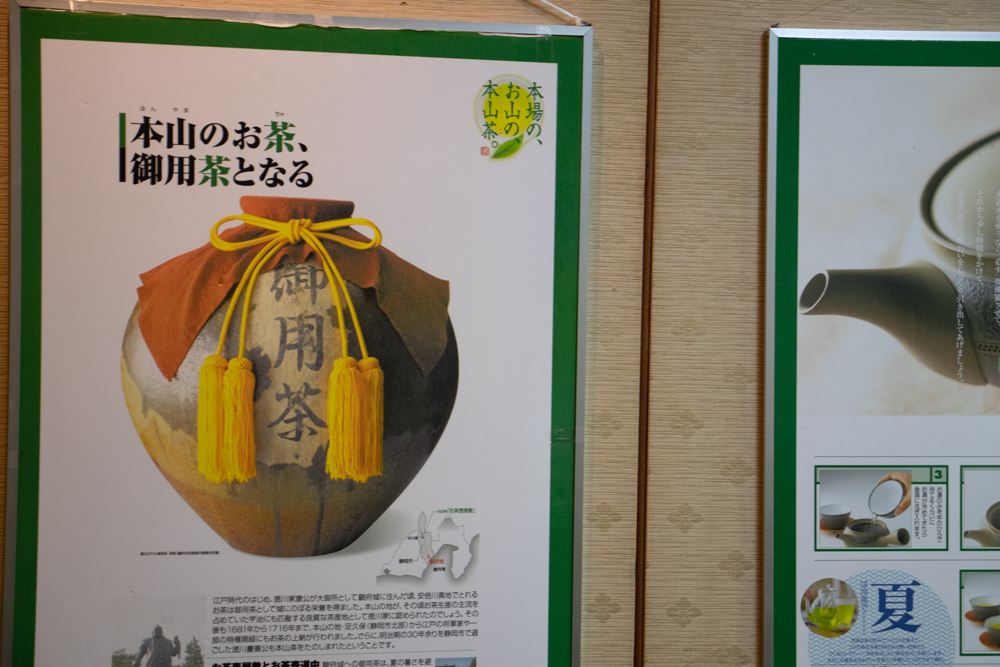
Mariko, Shizuoka City, is considered an important birthplace in the history of japanese black tea. Motokichi Tada, who devoted himself to promoting domestically produced black tea, was the first Japanese person to visit Assam and Darjeeling in faraway India, and brought valuable knowledge and skills back to his hometown.
Motokichi Tada also mentored Hikosaburo Sugiyama, the creator of the Yabukita variety, whose achievements are widely known in the tea industry.
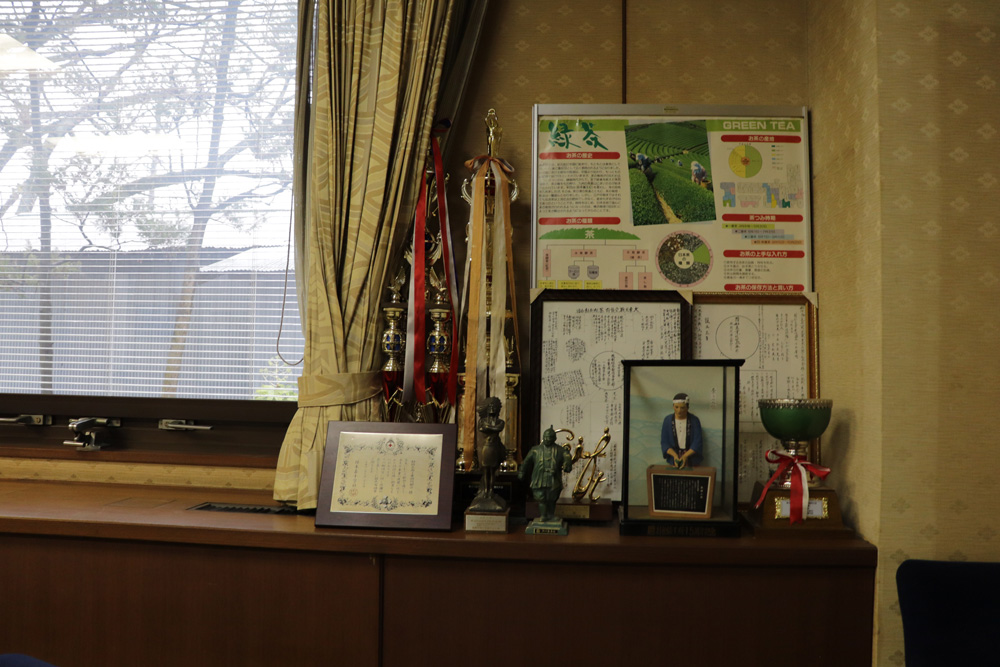
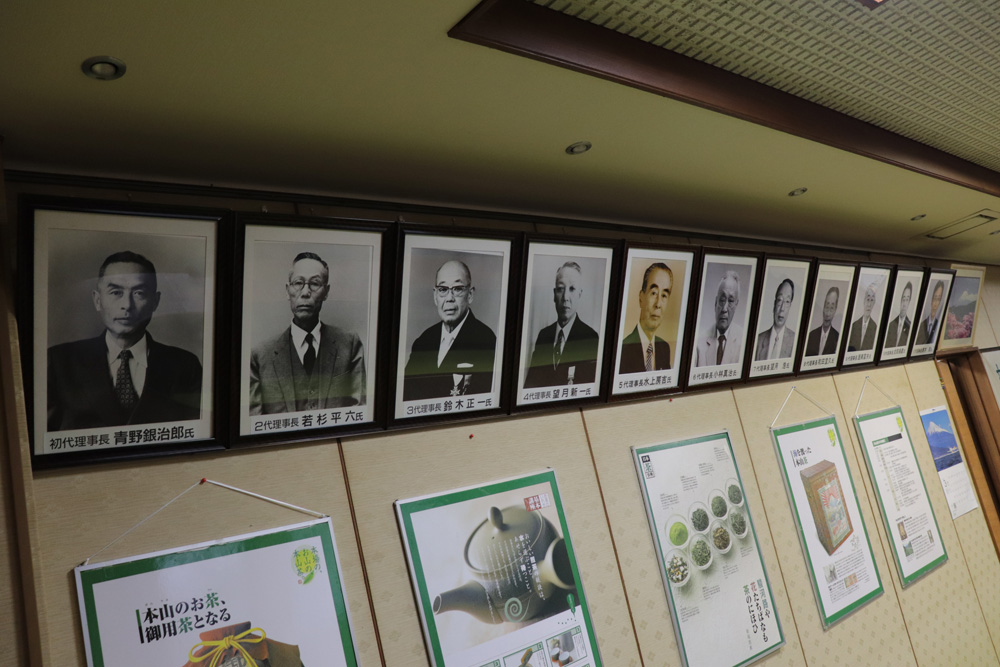 ▲The history of the Cooperative Association is displayed on the wall, with photographs of directors going back 14 generations. The 3rd generation is the grandfather of Chaya Suzuwa owner Atsumi; the 14th generation is his father.
▲The history of the Cooperative Association is displayed on the wall, with photographs of directors going back 14 generations. The 3rd generation is the grandfather of Chaya Suzuwa owner Atsumi; the 14th generation is his father.
Shizuoka tea has had a significant impact on the city’s development as well as its history. Although it is now possible to export tea from the Port of Shimizu, in the beginning the Port of Yokohama was in charge of tea export operations.
At that time it was necessary to transport tea from Shizuoka to Yokohama. To meet this transportation requirement, the Shizuoka Railway came into operation.
Thanks in part to the efforts of Kozaburo Unno, it eventually became possible to export tea directly from the Port of Shimizu to the rest of the world. Thanks to this, Shizuoka became the number one exporter of tea in Japan. This historical footprint remains, and many international trading companies still remain in the vicinity of the Chamachi (tea town) district.
–I see, Shizuoka’s development has largely revolved around tea.
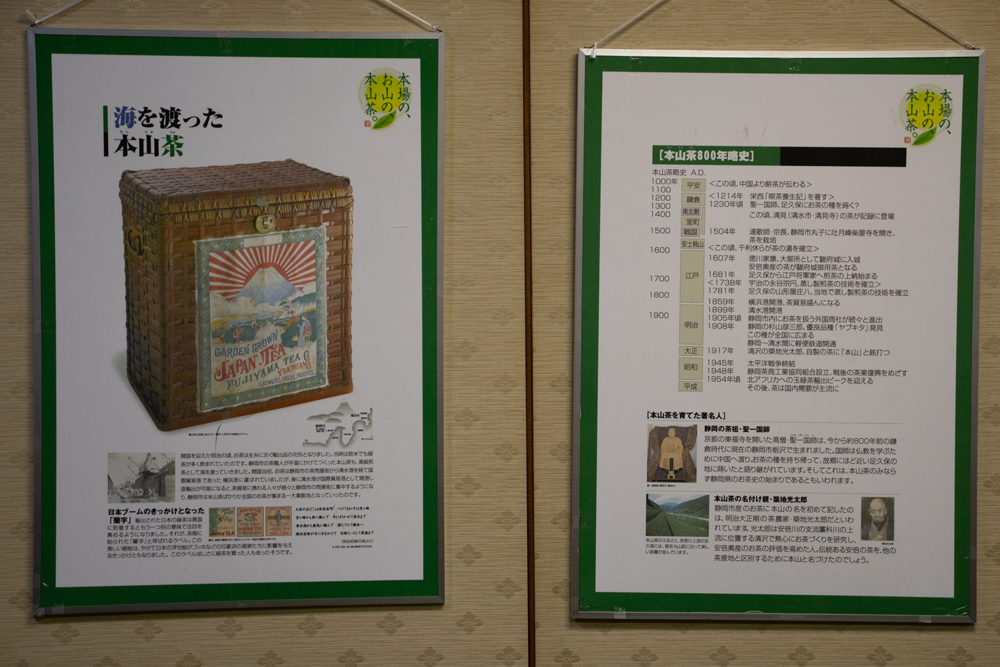
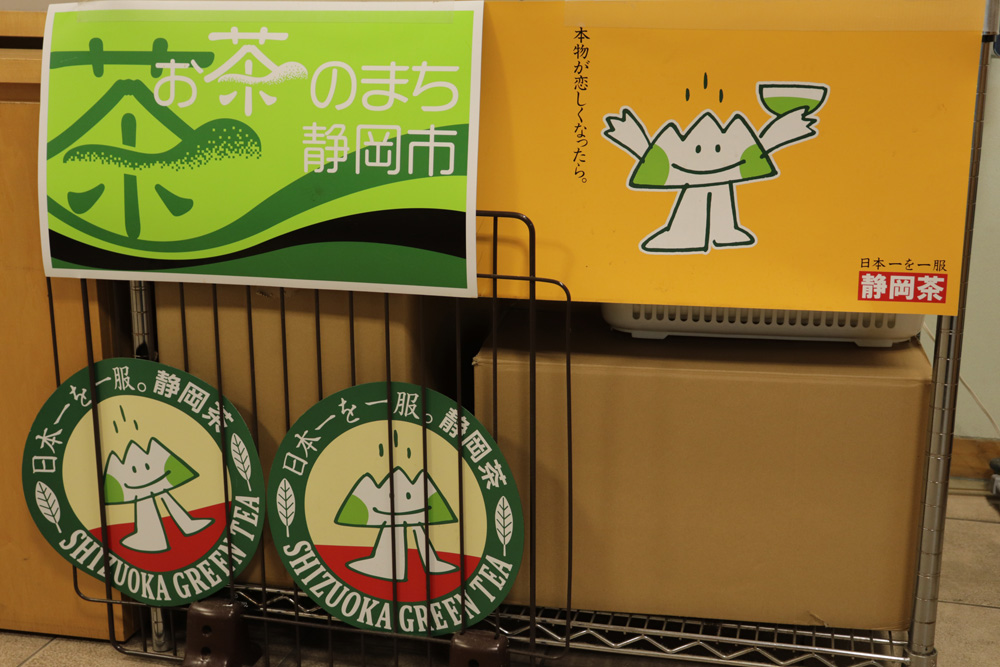
When I consider that I have been engaged in tea for many years, I can confident that “tea will always be a part of our lives.”
About two years ago, I retired from my executive position at a tea wholesaler of more than 30 years and chose to start my own business. Currently, I am engaged in lecturing and managing tea-related seminars and consulting services, making use of the know-how I have accumulated in the tea industry.
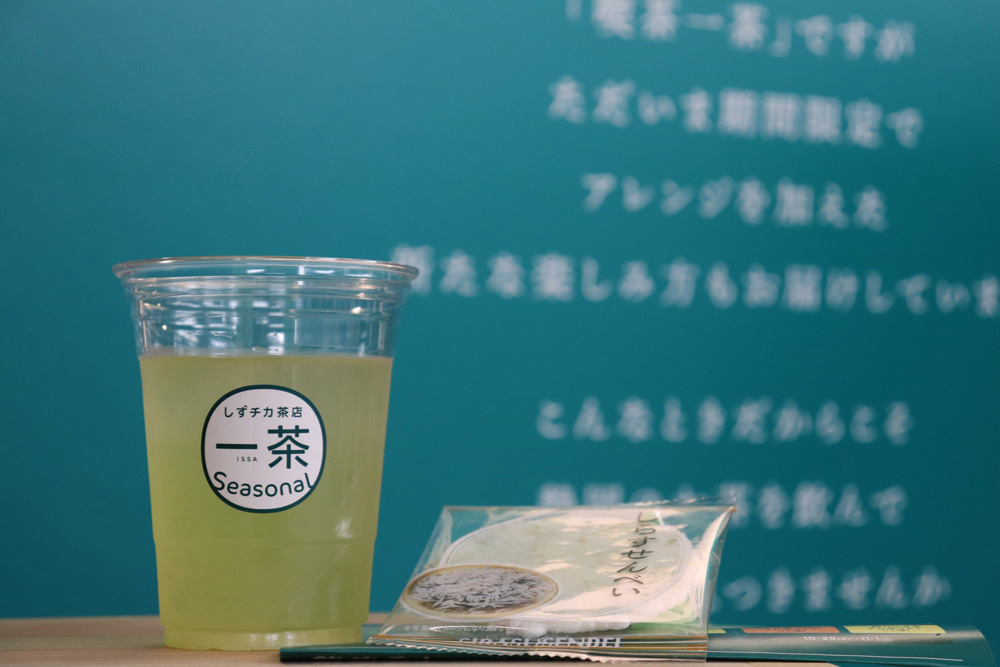
For more than 22 years now, I have been teaching as a resident instructor at Asahi Television Culture. Recently, I have seen many young people at my seminars and taking pictures of themselves brewing tea in a kyusu (Japanese teapot) and posting them on social networking sites.
Seeing this makes me feel that brewing tea in a kyusu, something that is an everyday activity for me, is seen by them as a fresh, innovative, and fashionable activity.
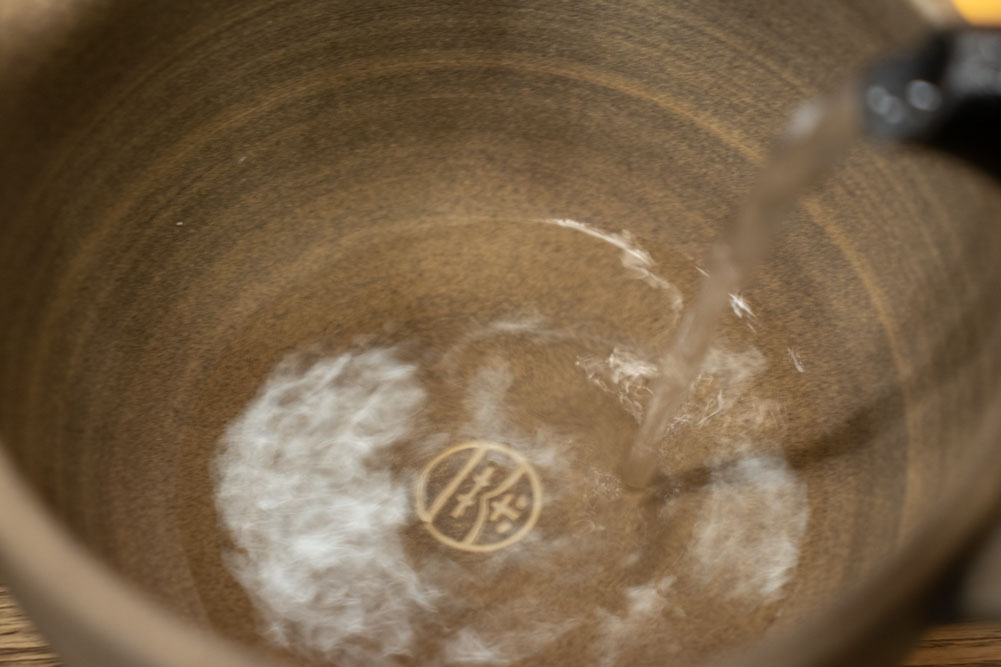
Perhaps there is a possibility that the managerial influences in the tea industry are changing how they engage with tea and what type of business they will continue to maintain in the future.
However, I believe that tea will continue to exist in the future, in an ever-changing shape and form.

Related articles : 11 Japanese Green Tea & Matcha Cafes near Shizuoka Station! Recommended Japanese tea and sweets stores!【Shizuoka Prefecture】
Related articles : Chaya Suzuwa’s Gougumi Japanese Tea Evoking Sensory Experiences【Shizuoka City, Shizuoka Prefecture】
Information of Shizuchika Tea Shop Issa
| Address | 49-1 Kurogane-cho, Aoi-ku, Shizuoka City, 420-0851, Japan JR Shizuoka Station North Exit Underground Plaza |
| Website | https://www.ocha.or.jp/issa/ |
| Phone number | +81 54-253-0030 |
| E-money and credit cards | Not available |
| Open | 10:00~19:00(LO18:30) |
| Closed | Wednesdays (or the following working day if the Wednesday is a public holiday), New Year’s Eve and New Year’s D |
| Parking lot | Not available |
| Access | 1 minute walk from Shizuoka Station. |
| Writer | Norikazu Iwamoto |
| Career | Ochatimes chief editer. Meeting with Vice Governor of Shizuoka prefecture. Judge of Shizuoka 100 tea’s award in 2021~24. Ocha Times link introduced at website of World O-CHA(Tea) Festival 2022, Tea Science Center, The City of Green Tea Shizuoka, Ministry of Agriculture, Forestry and Fisheries. |
| English translator | Calfo Joshua |
| Career | Born and raised in England, living in Japan since 2016. Studying arboriculture in Shizuoka Prefecture whilst operating his landscape business Calfo Forestry. Appreciating the nature of Japan and the culture that places such importance in it. |


 Go to Japanese page
Go to Japanese page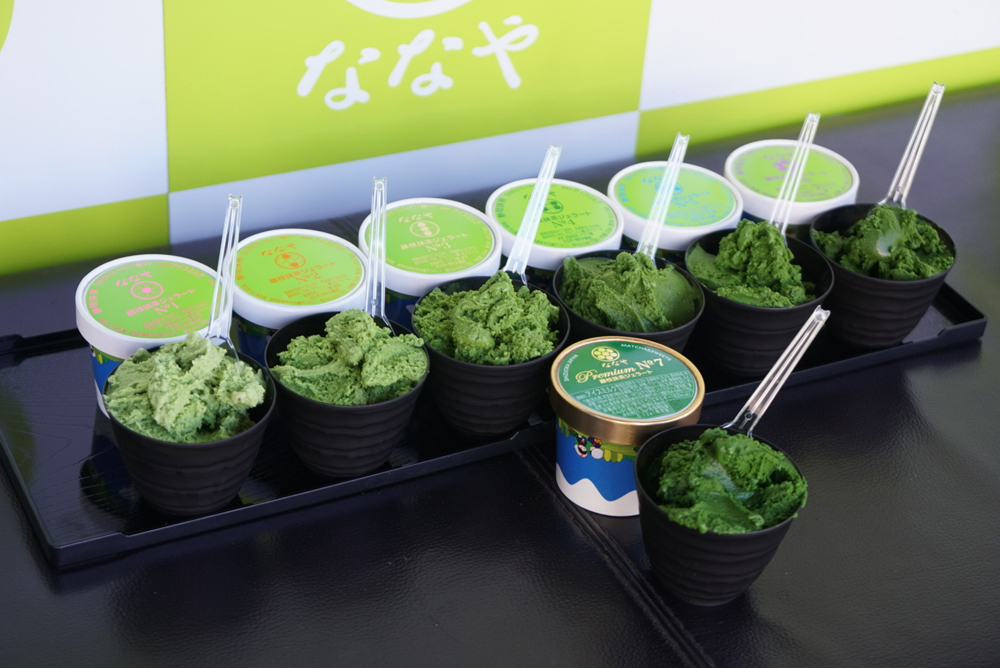
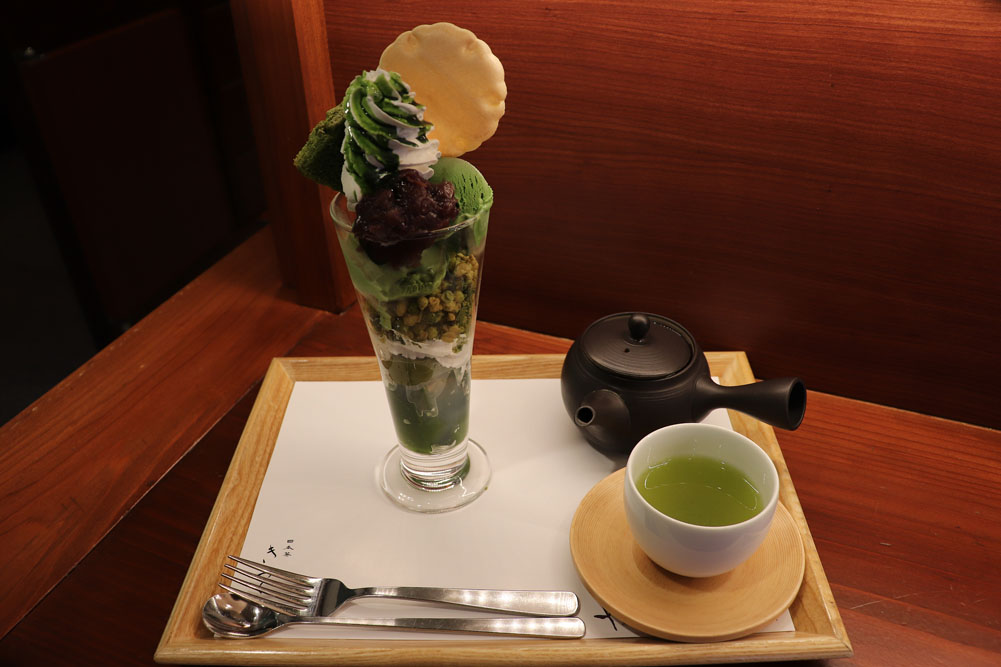
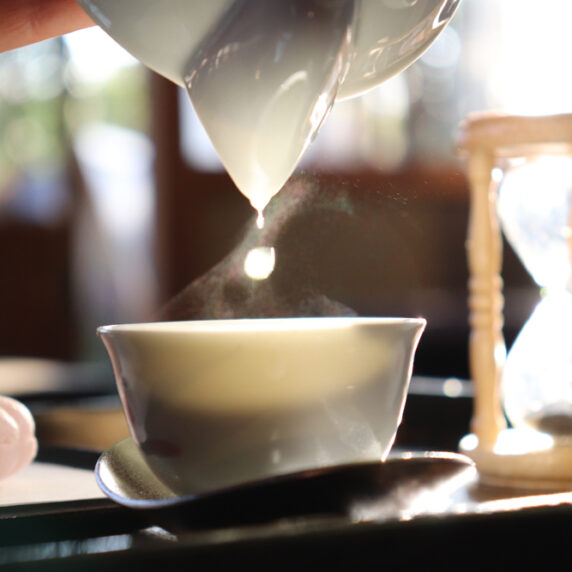





 on the red bar to close the slide.
on the red bar to close the slide. to see the
distance between the current location to the Chaya.
to see the
distance between the current location to the Chaya.